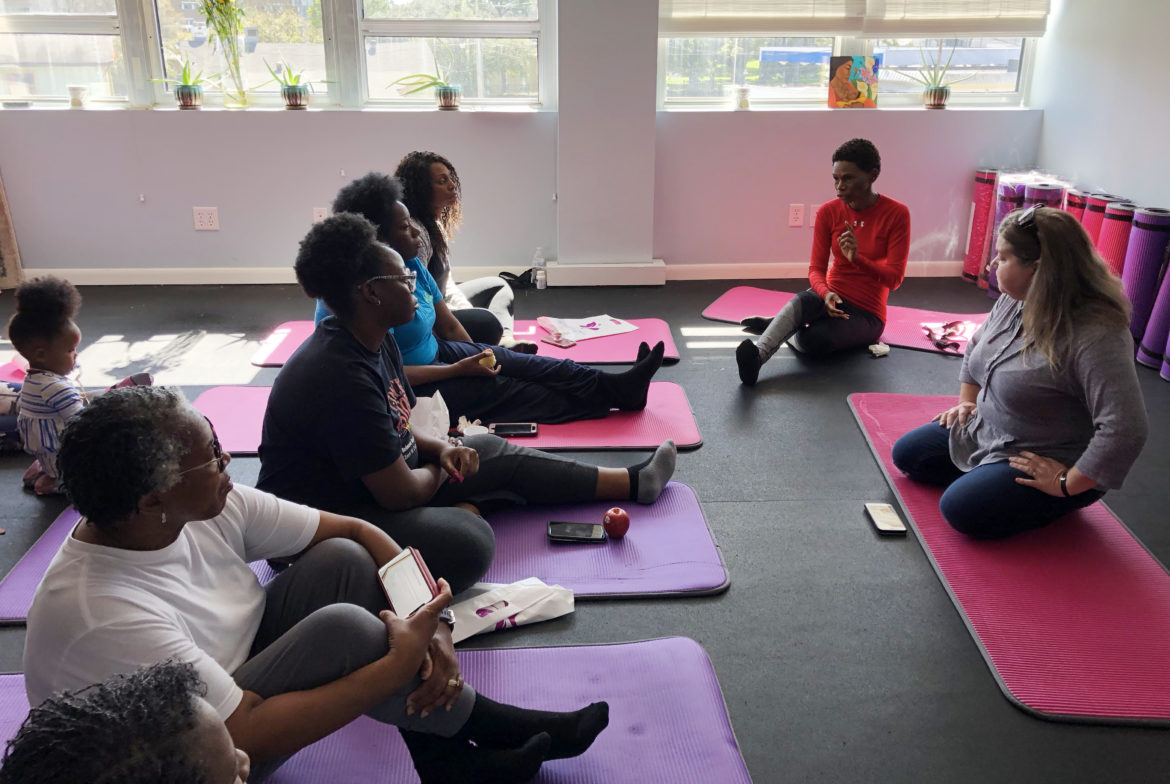Mississippi Today
Advocates say licensed midwives could help Mississippi’s maternity care desert. Bills appear dead

Advocates say licensed midwives could help Mississippi’s maternity care desert. Bills appear dead
Advocates say pending legislation on midwifery could help alleviate Mississippi’s lack of maternity health care and protect mothers and babies from those practicing without proper training.
But Senate Bill 2793 and House Bill 1081 are likely going to die without a vote in committee this session, as legislative leaders say they need more time to study the issue.
More than half of Mississippi’s 82 counties are considered “maternity care deserts,” with no hospitals providing obstetric care and no OB-GYNs. Advocates say trained midwives could help this shortage of care for low-risk pregnancies, but say the state should license and regulate them.
With the overturning of Roe v. Wade and a ban on abortions in Mississippi, advocates say trained midwives could help with the expected increase of thousands of deliveries a year for a health care system that is already woefully inadequate.
Mississippi is one of 14 states that does not regulate or license direct-entry midwives, those who practice without first becoming a nurse. Certified nurse midwives in the state are licensed as advanced practice registered nurses. There are only 26 certified nurse midwives in Mississippi, and only a few deliver babies, because only three hospitals allow them to.
Mississippi prevents free-standing, midwife-led clinics for low-risk births and prohibits certified nurse midwives from performing in-home births – both of which are popular in other states and in Europe. More mothers want personalized care at home or in a small clinic as opposed to giving birth in a larger hospital, and want natural birth instead of induced labor or non-necessary C-section surgeries for delivery that have become more and more common in hospitals.
But Mississippi’s lack of licensure or regulation also results in untrained or poorly trained people claiming to be midwives providing substandard – or dangerous – care to mothers and newborns at home.
“Anybody can say, ‘I’m a midwife,’ and nobody can stop them,” said Getty Israel, founder of Sisters in Birth, a nonprofit that pairs community health workers with low-income women, primarily Medicaid beneficiaries, to provide support during and after their pregnancies. Israel hopes to open Mississippi’s first birth center. Such centers in other states serve women with low-risk pregnancies, and provide compromise between hospital births and home births.
READ MORE: Bills to watch in the 2023 Mississippi legislative session
Israel said she supports midwifery and wants to see it become a viable alternative in Mississippi, but believes they should be state regulated and licensed.
Erin Raftery is with Better Birth Mississippi, a group advocating for the midwifery legislation. The group says, “Community-based midwifery is a key solution to the challenges faced by the maternity care system in Mississippi.” Trained midwives could help with health care shortages caused by closure of rural hospitals and help save Medicaid money by “minimizing the use of costly, ineffective interventions.”
“The goal of these bills is accountability,” Raftery said. “… This would provide protection for patients, and for midwives. This would also hopefully open the door for insurance coverage for midwife services, and help with the maternity desert.”
Raftery said her group knows of at least one infant death in Mississippi overseen by an unlicensed midwife, and that a similar instance a decade or so ago had also prompted proposed legislation. Raftery said licensure would help protect patients from the “select few” midwives practicing without training.
Senate Medicaid Chairman Kevin Blackwell, R-Southaven, authored the Senate midwife bill.
“I think we need to look at all our opportunities for health care in Mississippi,” Blackwell said. “We are last, and we won’t change. We need to look at all the other states that are changing the way they do things.”
Both Blackwell’s bill and a mirror one authored by Rep. Dana McLean, R-Columbus, would create a state board of licensed midwifery.
“There are community midwives already practicing in this state, and this would help legitimize them, provide some oversight, and I think our primary responsibility is to make sure those that are practicing are doing so with some standard of care and level of experience,” McLean said. “Safety for moms and babies is the first priority. But I think there’s also an issue of allowing for reimbursement for Medicaid and private insurance. They do require some sort of certification or licensure before they would reimburse for these services.
“Rural areas are closing maternity wards, and if this is an option that can help for low-risk births, then we need to explore that.”
But many physicians and hospital groups say child delivery should be overseen by trained physicians in hospital settings. Beyond these arguments, there has been a push by conservative groups and GOP lawmakers to reduce government agencies, boards and regulations, not create new licensing and a new regulatory board.
Nurse practitioners have also struggled for more autonomy and expanded scope of practice in Mississippi – with limited legislative success – saying they, too, could help with the state’s shortage of doctors and health services.
Israel said doctors and hospitals treat child birth as a “cash cow,” and that their lobbyists and influence at the Capitol prevent “progressive, evidence-based health care.”
The House and Senate bills are now in each chamber’s public health committee, facing a deadline for committee passage next week. That passage this year, or even a vote in committee, appeared unlikely days before the deadline.
House Public Health Chairman Sam Mims, R-McComb, asked Wednesday about the midwifery bill pending in his committee, said he was unaware of it.
“I’ll go look at it,” Mims said. “I will read it. I will go look at it. Thank you, though.”
Raftery said her group had met with Mims and his committee vice chair only a couple of weeks ago and outlined the bill. She said Mims told her he would be opposed because he’s against new government boards and licensing.
Senate Public Health Chairman Hob Bryan, D-Amory, said he doubts he will bring the bill up for a vote in his committee this year.
“It’s sort of late in the session, and I really wasn’t aware of this legislation before we got here,” said Senate Public Health Chairman Hob Bryan, D-Amory. “I don’t think the committee would have time to fully study this … I’ve met with two different midwife groups, and I try to listen to people. I learned that at least one group will assign someone to an individual, and they will stay with that person, work with them, throughout their pregnancy and after delivery, and be there for them to discuss other health care issues. I think that is a very good idea, that could perhaps carry over into other health care services, and I am interested in learning more.
“I am neither opposed to nor supportive (of the midwifery legislation), but I have an open mind,” Bryan said.
This article first appeared on Mississippi Today and is republished here under a Creative Commons license.
Did you miss our previous article…
https://www.biloxinewsevents.com/?p=205378
Mississippi Today
House gives Senate 5 p.m. deadline to come to table, or legislative session ends with no state budget
The House on Wednesday attempted one final time to revive negotiations between it and the Senate over passing a state budget.
Otherwise, the two Republican-led chambers will likely end their session without funding government services for the next fiscal year and potentially jeopardize state agencies.
The House on Wednesday unanimously passed a measure to extend the legislative session and revive budget bills that had died on legislative deadlines last weekend.
House Speaker Jason White said he did not have any prior commitment that the Senate would agree to the proposal, but he wanted to extend one last offer to pass the budget. White, a Republican from West, said if he did not hear from the Senate by 5 p.m. on Wednesday, his chamber would end its regular session.
“The ball is in their court,” White said of the Senate. “Every indication has been that they would not agree to extend the deadlines for purposes of doing the budget. I don’t know why that is. We did it last year, and we’ve done it most years.”
But it did not appear likely Wednesday afternoon that the Senate would comply.
The Mississippi Legislature has not left Jackson without setting at least most of the state budget since 2009, when then Gov. Haley Barbour had to force them back to set one to avoid a government shutdown.
The House measure to extend the session is now before the Senate for consideration. To pass, it would require a two-thirds majority vote of senators. But that might prove impossible. Numerous senators on both sides of the aisle vowed to vote against extending the current session, and Lt. Gov. Delbert Hosemann who oversees the chamber said such an extension likely couldn’t pass.
Senate leadership seemed surprised at the news that the House passed the resolution to negotiate a budget, and several senators earlier on Wednesday made passing references to ending the session without passing a budget.
“We’ll look at it after it passes the full House,” Senate President Pro Tempore Dean Kirby said.
The House and Senate, each having a Republican supermajority, have fought over many issues since the legislative session began early January.
But the battle over a tax overhaul plan, including elimination of the state individual income tax, appeared to cause a major rift. Lawmakers did pass a tax overhaul, which the governor has signed into law, but Senate leaders cried foul over how it passed, with the House seizing on typos in the Senate’s proposal that accidentally resembled the House’s more aggressive elimination plan.
The Senate had urged caution in eliminating the income tax, and had economic growth triggers that would have likely phased in the elimination over many years. But the typos essentially negated the triggers, and the House and governor ran with it.
The two chambers have also recently fought over the budget. White said he communicated directly with Senate leaders that the House would stand firm on not passing a budget late in the session.
But Senate leaders said they had trouble getting the House to meet with them to haggle out the final budget.
On the normally scheduled “conference weekend” with a deadline to agree to a budget last Saturday, the House did not show, taking the weekend off. This angered Hosemann and the Senate. All the budget bills died, requiring a vote to extend the session, or the governor forcing them into a special session.
If the Legislature ends its regular session without adopting a budget, the only option to fund state agencies before their budgets expire on June 30 is for Gov. Tate Reeves to call lawmakers back into a special session later.
“There really isn’t any other option (than the governor calling a special session),” Lt. Gov. Delbert Hosemann previously said.
If Reeves calls a special session, he gets to set the Legislature’s agenda. A special session call gives an otherwise constitutionally weak Mississippi governor more power over the Legislature.
This article first appeared on Mississippi Today and is republished here under a Creative Commons license.
Mississippi Today
Candice Wilder joins Mississippi Today as new higher education reporter
Mississippi Today is pleased to announce that Candice Wilder has joined the newsroom as our newest higher education reporter.
Wilder takes over higher ed coverage from Mississippi Today reporter Molly Minta, who built the beat starting in early 2021 but has since moved to the newsroom’s team covering the city of Jackson.
“I’m thrilled to join a talented and ambitious team of journalists who provide critical news and information to Mississippians,” Wilder said. “Reporting on the state’s colleges and universities at this moment is more important now than ever. My goal is to develop thoughtful coverage and tell crucial stories that will continue to serve and reflect these communities.
Wilder, an Ohio native, was one of 19 founding staff members of Signal Cleveland, an inaugural nonprofit newsroom part of Signal Ohio. There, she developed a beat that provided accessible health news and information to residents of Cleveland. Her work has led to recognitions from the Cleveland Press Club and the Association of Healthcare Journalists.
“We couldn’t be more excited to welcome Candice to our newsroom,” said Adam Ganucheau, Mississippi Today’s editor-in-chief. “So many aspects of the higher education system are under intense scrutiny and attack across the country — from free speech to funding to accountability — and Mississippi is certainly no exception. Our colleges and universities are at the heart of critical conversations about equity, access, and the future of our state as a whole. Candice brings a sharp eye, strong reporting skills, and genuine curiosity to our team, and I’m confident that her work will help Mississippians navigate the often complicated and evolving nature of higher ed here.”
“We’re so happy to have someone with Candice Wilder’s passion and experience to pick up the mantle of higher education reporting at Mississippi Today,” said Debbie Skipper, who will serve as her editor. “Molly Minta set a high standard in our reporting in this area, and I know Candice will maintain that while offering her own professional perspective.”
This article first appeared on Mississippi Today and is republished here under a Creative Commons license.![]()
Mississippi Today
PSC revives solar programs a year after suspending them
The Mississippi Public Service Commission voted unanimously on Tuesday to lift a stay on programs offering incentives for solar power. The same commission voted to suspend the programs last April.
The PSC initially voted in 2024 to suspend three programs: “Solar for Schools,” which allows school districts to essentially build solar panels for free in exchange for tax credits, as well as incentives for battery storage and low-income participants in the state’s “distributed generation” rule. Mississippi’s “distributed generation” rule is similar to net metering in other places, but reimburses customers for less than what most states offer.
Net metering is a program where power companies — in this case Entergy Mississippi and Mississippi Power — reimburse customers who generate their own solar power, often with rooftop panels, and sell any extra power back to the grid.
The PSC suspended the programs in 2024 because, at the time, the federal government was also offering funds through its “Solar for All” initiative. The commission reasoned that the state didn’t need to add incentives, which the previous commission approved in 2022 on top of the new funding. After learning that the state government didn’t receive any “Solar for All” funding, the PSC decided on Tuesday to reverse course.
While the State of Mississippi didn’t receive any of the funding, Hope Enterprise Corp. did get $94 million last year through the program to bring solar power to low-income and disadvantaged homes in the state.
The previous PSC created the “Solar for Schools” program as a way to save school districts money on their power bills to help with other expenses. While no districts were able to make use of the program before the PSC suspended it last year, other districts have seen savings after installing solar panels. Any of the 95 school districts within the Entergy and Mississippi Power grids are eligible for the PSC incentives.
Solar advocates disagreed with the PSC’s assertion that federal “Solar for All” funding would have replaced the PSC programs, which went into effect in January 2023, arguing that the commission’s ruling would scare off potential new business. Those advocates applauded Tuesday’s reversal, saying the incentives will support professions within the solar supply chain such as electricians, roofers, manufacturers and installers.
“Yesterday’s actions by the MPSC sends a strong signal that Mississippi is open for business,” Monika Gerhart, executive director of the Gulf States Renewable Energy Industries Association, said via email. “For schools and homeowners that want to save money on their light bill, yesterday’s vote creates additional savings to install solar.”
This article first appeared on Mississippi Today and is republished here under a Creative Commons license.![]()
-

 Mississippi Today19 hours ago
Mississippi Today19 hours agoPharmacy benefit manager reform likely dead
-

 News from the South - Alabama News Feed6 days ago
News from the South - Alabama News Feed6 days agoSevere storms will impact Alabama this weekend. Damaging winds, hail, and a tornado threat are al…
-

 News from the South - Alabama News Feed5 days ago
News from the South - Alabama News Feed5 days agoUniversity of Alabama student detained by ICE moved to Louisiana
-

 News from the South - Oklahoma News Feed4 days ago
News from the South - Oklahoma News Feed4 days agoTornado watch, severe thunderstorm warnings issued for Oklahoma
-

 News from the South - Louisiana News Feed7 days ago
News from the South - Louisiana News Feed7 days agoSeafood testers find Shreveport restaurants deceiving customers with foreign shrimp
-

 News from the South - West Virginia News Feed7 days ago
News from the South - West Virginia News Feed7 days agoRoane County Schools installing security film on windows to protect students
-

 News from the South - Virginia News Feed5 days ago
News from the South - Virginia News Feed5 days agoYoungkin removes Ellis, appoints Cuccinelli to UVa board | Virginia
-

 News from the South - Florida News Feed6 days ago
News from the South - Florida News Feed6 days agoPeanut farmer wants Florida water agency to swap forest land














































